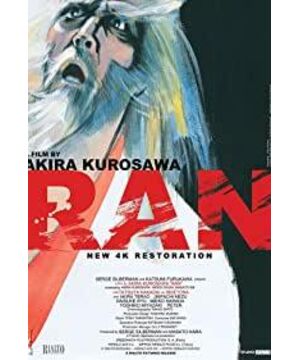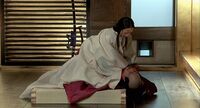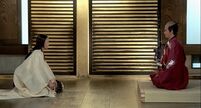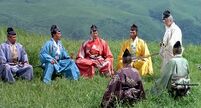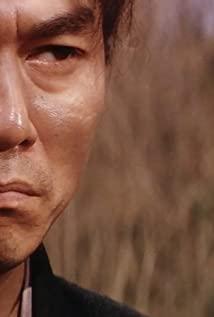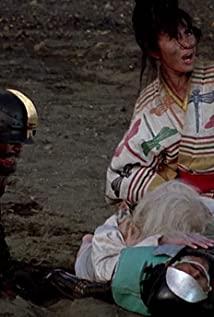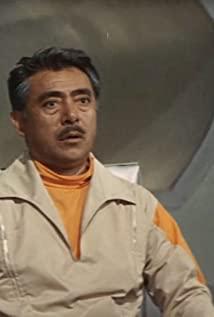As Shakespeare's well-known masterpiece, "King Lear" has happened countless times in different families at different times in human history. "Ran" adapted by Akira Kurosawa is his interpretation on the Japanese cultural stage. Akira Kurosawa fictionalized a huge "Ichimon family" mixed with traditional Japanese culture. The name of the hometown governor Xiuhu comes from Hideyoshi and Xinhu respectively, representing the protagonist's humble origin and the fate of the quilt exile. The training of the three arrows left to the three sons comes from the story of Moori Motoji, who gave way to himself, and the fate of being backlashed is very similar to Saito Ichido Dosan. The repeated confessions of Hachiman Bodhisattva and characters to gods and Buddhas are the embodiment of Japanese Buddhism. The film is called "Ran". Akira Kurosawa, who is used to the language of colors and empty shots, uses five different colors and a large number of empty shots to depict this tragedy that was destined to be unexpected and reasonable from the beginning. The representative color of the eldest son is the noble yellow. As the first heir of the family and the head of the biggest faction, he is determined to seize the power and benefits of the family. The second son's representative color red symbolizes his restless and endless desire, and the third son's representative color blue symbolizes his inner rationality and ease. The representative colors of the neighboring Fujimaki family and Ayabe family are white and black respectively - black and white are indistinguishable, the former allies are ultimately hunters who take advantage of the fire, incarnate Kuroko and Shiroko, and carve up the land of the literati. In order to shoot suitable weather and sky shots, the crew waited for hundreds of days to shoot, and different empty shots also gave different bridges specific meanings. When the Yiwen family engaged in an alliance with the two neighboring families, the empty shot of the sky was a sea of clouds in the blue sky like a castle in the sky. When the third city was besieged, the dark clouds in the sky were the arrival of the tragic fate of a literati, accompanied by the cry of the army and the roar of arquebuses. In the end, when Saburo and the old master died together, the light in the dark clouds represented the pity of the gods for them, and also expressed the tragic nature of the story. "Is it fun to play with human tears?" "Don't blame the gods, the gods are crying too". These two lines of dialogue bring the film to an end. In addition to the characters themselves, Akira Kurosawa's film perspective also makes good use of the high-altitude perspective of God. For example, the old master Xiuhu and the clown lost together in the ruins of the old city, showing the helplessness and hesitation of the characters and the insignificance of being in a barren hill, which further arouses the audience's thinking about "everything is impermanent, and the prosperous will decline". In the end, Saburo and the old master died in the wilderness, and the perspective of the big perspective shot shows that the only remaining family affection in the chaotic world has disappeared in the ruthless accident, which is deeply sympathetic. Like "Shadow Warrior", "Chaos" is also an epic film portrayed with unique lens language and color, and the focus often highlights the views of small people's fate, such as the occasional performance of Crazy Ami in "Ran", which is playful Except for the dismal end of the one-word family. The double-tree flowers of the sala have lost their color, and the prosperous ones turn down like vicissitudes of life. Qiangliang and domineering finally perished, like dust in the wind.
View more about Ran reviews


